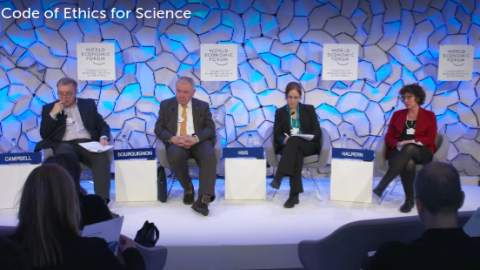Can scientists agree on a code of ethics?

Scientists typically aim to be ethical, but can they agree on a general code of ethics?
That was a topic of conversation at the recent World Economic Forum’s Annual Meeting held in Davos, Switzerland. The World Economic Forum’s stated goal for the gathering is that by “coming together at the start of the year, we can shape the future by joining this unparalleled global effort in co-design, co-creation and collaboration.” Building on this year’s theme of “Creating a Shared Future in a Fractured World,” there was a lively panel discussion around “A Code of Ethics for Science.”
Right not, there is not an widely-accepted code of ethics for science.
The panel was discussing a project of the World Economic Forum Young Scientists community, which put out a Code of Ethics to coincide with this year’s 48th annual World Economic Forum meeting. The document stems from a June 2016 workshop that the young scientist group had “to identify and reflect on the cross-cutting ethical issues they are faced with.” In consultation with other ethicists and researchers, the World Economic Forum Young Scientists community was able to design a Code of Ethics. The goal is to offer:
“a framework for the promotion of best behaviours in the conduct of scientific research. The objective of the Young Scientists community in publishing this Code of Ethics is to establish the foundations for open conversations that will unite different opinions, perspectives and recommendations to safeguard a positive and sound research environment.”-From the Code of Ethics, developed by the World Economic Forum Young Scientist community
The panel on stage at the World Economic Forum’s annual meeting to discuss a Code of Ethics for Science included moderator Phillip Campbell (Editor-in-Chief, Nature), Gabriela Hug (Professor, Power Systems Laboratory, ETH Zurich), Jean-Pierre Bourguignon (President, European Research Council), and Jodi Halpern (Professor of Bioethics and Medical Humanities, University of California, Berkeley). Gabriela Hug was the representative from the Young Scientists group.
The Code of Ethics put forth by the Young Scientists group laid out the following seven principles, of which are viewed as aspirational as opposed to baseline. (An audience member during the panel pointed out that in 2007 Sir David King came up with a code for science. His forth principle was to act lawfully. When questioned as to why such basics weren’t listed in the Code of Ethics being presented, Gabriela Hug stated that legality was something already assumed and that the goal of their principles was to be an aspiration for scientists.)
The seven principles laid out in the Code of Ethics are:
-Engaging with the public
-Pursuing the truth
-Minimizing harm
-Engaging with decision makers
-Supporting diversity
-Being a mentor
-Being accountable
“As academia is largely a self-regulated community, codes of ethics provide scientists with the support they need to safeguard high standards of behaviour and to make explicit those social norms that allow individuals to operate independently. Many codes of ethics have been drafted, but so far no code that is interdisciplinary and global in its perspective has achieved universal uptake. Being an international group of diverse scientists, be it in terms of research area or cultural background, the authors of this Code of Ethics are thus proposing a much-needed framework for ethical research, to not only shape the behaviour of individuals but also the processes of the scientific institutions that are to facilitate this cultural shift.”-From the Code of Ethics, developed by the World Economic Forum Young Scientist community
Moderator Phillip Campbell started the conversation by emphasizing the these issues may seem easy to agree out, but there are obstacles in the way. “These are very big challenges, actually,” said Campbell. “They sound quite simple, but to implement them requires structural support.”
Campbell’s point was brought into focus later in the panel discussion as multiple academics brought up their concerns and hesitations during the Q & A. For example, one questioner strongly disagreed with the verbiage of calling the seven principles listed by the Young Scientists as”principles,” and thought a different term was need. Another questioner thought that the principles were not always attainable, and pointed to “being a mentor” as something that should not be required of every scientist. Gabriela Hug responded that the principles were again an aspiration, and that there can be exceptions made. Jodi Halpern chimed in that the Code of Ethics presented may want to include a paragraph stating the intended flexibility.
”I don’t think that many people, even at the World Economic Forum, have the tools of reasoning to look at these things. Whereas almost everybody here knows how to make a statistical assessment or something like that. It’s basic philosophical literacy that I think we’re missing.” -Professor Jodi Halpern
From the tone of audience questions, which occurred for the last twenty minutes of the hour-long panel discussion, having a widely adopted code of ethics for scientists will be an uphill battle. The moderator made light of this, noting the tendency for academia to get caught up in the finer details of semantics. “This is exactly what will happen in academia,” said Campbell.
”At the same time,” he continued, “we can’t have a collective editing session where we get all the words exactly right. The best hope for this to have an impact is to take it out there, acknowledge that the language in imprecise and flawed, but the principles that are aspirational, even if there is just one that sticks, that would be great.”
==
David Ryan Polgar is a writer, speaker, and co-host of Funny as Tech. You can connect with him at @TechEthicist





